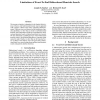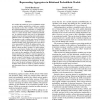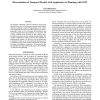69
Voted
AAAI
2015
9 years 9 months ago
2015
We present an intuitive explanation for the limited effectiveness of front-to-end bidirectional heuristic search, supported with extensive evidence from many commonly-studied doma...
69
Voted
AAAI
2015
9 years 9 months ago
2015
Ensemble learning is among the state-of-the-art learning techniques, which trains and combines many base learners. Ensemble pruning removes some of the base learners of an ensembl...
59
Voted
AAAI
2015
9 years 9 months ago
2015
We consider the problem of, given a probabilistic model on a set of random variables, how to add a new variable that depends on the other variables, without changing the original ...
67
Voted
AAAI
2015
9 years 9 months ago
2015
We study strong equilibria in symmetric capacitated costsharing games. In these games, a graph with designated source s and sink t is given, and each edge is associated with some ...
60
Voted
AAAI
2015
9 years 9 months ago
2015
Commenting is a popular facility provided by news sites. Analyzing such user-generated content has recently attracted research interest. However, in multilingual societies such as...
60
Voted
AAAI
2015
9 years 9 months ago
2015
The problem of planning or discrete control for timed system has earlier been solved with various constraint-based solution methods, including Constraint Programming, SAT solvers,...
60
Voted
AAAI
2015
9 years 9 months ago
2015
Link prediction functions are important tools that are used to predict the evolution of a network, to locate hidden or surprising links, and to recommend new connections that shou...
69
Voted
AAAI
2015
9 years 9 months ago
2015
We propose a novel representation for coalitional games with externalities, called Partition Decision Trees. This representation is based on rooted directed trees, where non-leaf ...
62
Voted
AAAI
2015
9 years 9 months ago
2015
In recent work, Langley et al. (2014) introduced UMBRA, a system for plan and dialogue understanding. The program applies a form of abductive inference to generate explanations in...
57
Voted
AAAI
2015
9 years 9 months ago
2015
We consider the problem of identifying discrepancies between training and test data which are responsible for the reduced performance of a classification system. Intended for use...




